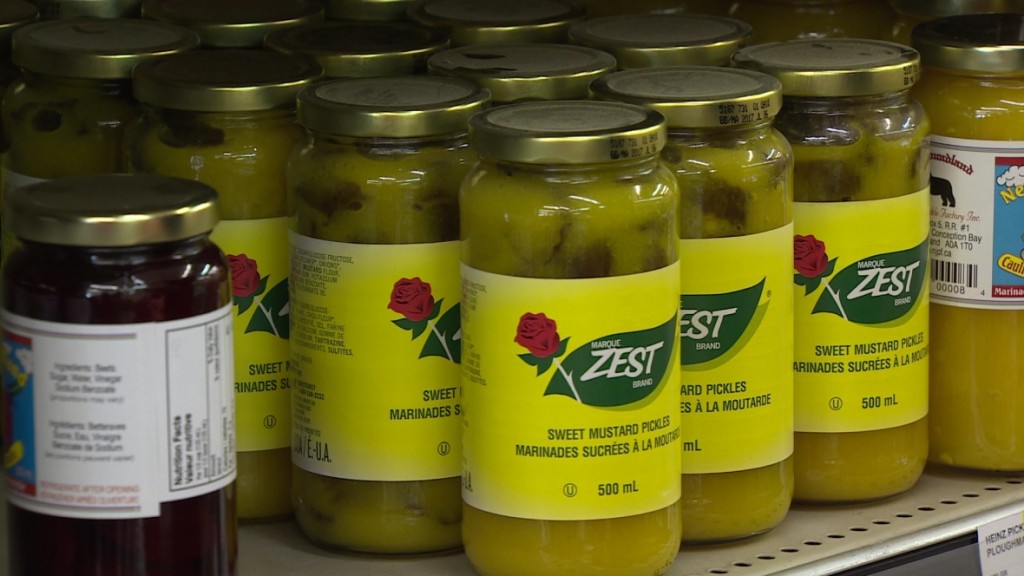The Great Mustard Pickle Panic of 2016
Food can be very regional. While over time, some foods cross borders and permeate cultures, there are plenty of examples of specific tastes remaining within an insular community. For example, there’s the item pictured below, which chances are, you’ve never heard of.

That’s a jar of “mustard pickles.” Having never eaten one, I can’t give you a first-hand account of what they’re like, so let’s use Atlas Obscura’s summary:
A mustard pickle is essentially what it sounds like—cucumbers, onions, and cauliflower [cauliflower??], chopped up, brined, and smothered in a thick yellow sauce. When jarred and lined up in a pantry, mustard pickles look both sunny and vaguely menacing, like a row of Don’t Walk signs. Their flavor is similarly complex: a good mustard pickle, says chef Amy Anthony, is “a harmonious balance of sweet, acid, and all the mustard.”
Sounds… interesting. It’s not hard to see why the product didn’t catch on in most of the world. But if you’re in Newfoundland, the Canadian province home to about half a million people, the opposite is true. Mustard pickles are a culinary staple, as important to the local food culture as Jiggs dinner and figgy duff. (No, you aren’t supposed to know what those two things are, either. Rather than use this space to go down a rabbit hole of the food habits of Newfoundlanders, you can click those links if interested.) The most popular brands of mustard pickles were called Zest, pictured above, and in second place, Habitant. Both were made by the Canadian arm of jelly and jam company Smucker’s, and you’ve probably picked up on the use of the past tense to describe both products. That’s intentional: in March of 2016, Smucker’s announced they would be discontinuing both lines of mustard pickles, citing poor sales.
Almost immediately, Newfoundlanders flocked to the market, per the CBC. Jars of mustard pickles flew off the shelves. A brisk re-sale market for the now-rare condiment hit the auction websites, per Buzzfeed, with one seller asking $12,000 for a pack of a dozen. (That was probably a joke, though; the rest of the listings were at $10/jar — about five times the normal retail price.) Devotees of the pickles-in-yellow took to social media to complain, joke, and commiserate over the loss of their common culinary touchstone. It wasn’t quite bedlam — it was more of a collective grieving process than it was a protest — but it definitely dominated local news and conversations for the week. And yet, it wasn’t enough to get Smucker’s to reverse their decision. It looked like mustard pickles were going to go from locally common to exceedingly rare.
But the mustard pickle lived to see another day. The public outcry mustered (sorry) another manufacturer into action, one which disagreed with Smucker’s take on the viability of cucumbers floating in a fluorescent sauce. About a week after Smucker’s announcement, a company called Bick’s issued a press release stating that they’d fill the void left by the end of the Zest/Habitant lines. The new mustard pickles came out in the summer to acceptable reviews.
Bonus fact: Another food which hasn’t crossed cultures is casu marzu, a Sardinian delicacy which, so far, has stayed on Sardinia and its nearby island of Corsica. And thank heaven for that. Casu marzu is more colloquially known as “maggot cheese” because that’s a very accurate way to describe the food item: a person dining on casu marzu cuts it open to reveal the army of still-live maggots. As Wikipedia explains, the maggot larva “are deliberately introduced to the cheese, promoting an advanced level of fermentation and breaking down of the cheese’s fats.” The larva “appear as translucent white worms” measuring about a quarter of an inch (8mm) in length. Want to give it a try? Godspeed, and wear goggles. Wikipedia continues: “When disturbed [e.g. when you cut into the cheese], the larvae can launch themselves for distances up to 15 cm (6 in).”
From the Archives: Dye It: When butter went pink. Also, the bonus item is about Newfoundland’s black market in butter.
Related: Mustard pickles.
